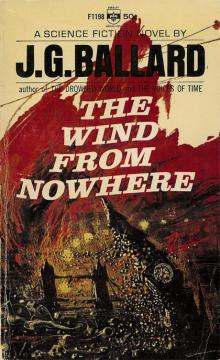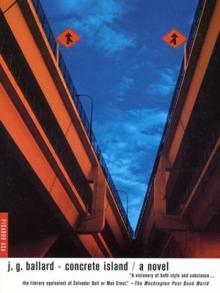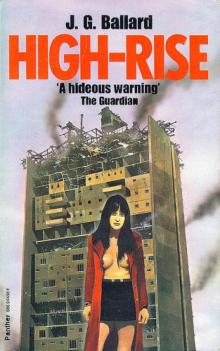- Home
- J. G. Ballard
Chronopolis Page 4
Chronopolis Read online
Page 4
Powers smiled wryly to himself and examined the first exhibit, an old EEG tape traversed by a series of faded inky wriggles. It was labeled: “Einstein, A.; Alpha Waves, 1922.”
He followed Kaldren around, sipping slowly at his drink, enjoying the brief feeling of alertness the amphetamine provided. Within two hours it would fade, leaving his brain feeling like a block of blotting paper.
Kaldren chattered away, explaining the significance of the so-called Terminal Documents. “They’re end-prints, Powers, final statements, the products of total fragmentation. When I’ve got enough together I’ll build a new world for myself out of them.” He picked a thick paper-bound volume off one of the tables, riffled through its pages. “Association tests of the Nuremberg Twelve. I have to include these ...”
Powers strolled on absently without listening. Over in the corner were what appeared to be three ticker-tape machines, lengths of tape hanging from their mouths. He wondered whether Kaldren was misguided enough to be playing the stock market, which had been declining slowly for twenty years.
“Powers,” he heard Kaldren say. “I was telling you about the Apollo Seven.” He pointed to a collection of typewritten sheets tacked to a screen. “These are transcripts of their final signals radioed back from the recording monitors.”
Powers examined the sheets cursorily, read a line at random.
. . BLUE . . . PEOPLE . . . RECYCLE . . . ORION . . . TELEMETERS . . .”
Powers nodded noncommittally. “Interesting. What are the ticker tapes for over there?”
Kaldren grinned. “I’ve been waiting for months for you to ask me that. Have a look.”
Powers went over and picked up one of the tapes. The machine was labeled: “Auriga 225-G. Interval: 69 hours.”
The tape read:
96,688,365,498,695
96,688,365,498,694
96,688,365,498,693
96,688,365,498,692
Powers dropped the tape. “Looks rather familiar. What does the sequence represent?”
Kaldren shrugged. “No one knows.”
“What do you mean? It must replicate something.”
“Yes, it does. A diminishing mathematical progression. A countdown, if you like.”
Powers picked up the tape on the right, tabbed: “Aries 44R951. Interval: 49 days.”
Here the sequence ran:
876,567,988,347,779,877,654,434
876,567,988,347,779,877,654,433
876,567,988,347,779,877,654,432
Powers looked round. “How long does it take each signal to come through?”
“Only a few seconds. They’re tremendously compressed laterally, of course. A computer at the observatory breaks them down. They were first picked up at Jodrell Bank about twenty years ago. Nobody bothers to listen to them now.”
Powers turned to the last tape.
6,554
6,553
6,552
6,551
“Nearing the end of its run,” he commented. He glanced at the label on the hood, which read: “Unidentified radio source, Canes Venatici. Interval 97 weeks.”
He showed the tape to Kaldren. “Soon be over.”
Kaldren shook his head. He lifted a heavy directory-sized volume off a table, cradled it in his hands. His face had suddenly become somber and pallid. “I doubt it,” he said. “Those are only the last four digits. The whole number contains over 50 million.”
He handed the volume to Powers, who turned to the title page. “Master Sequence of Serial Signal received by Jodrell Bank Radio-Observatory, University of Manchester, England, 0012-59 hours, 21-5-72. Source: NGC 9743, Canes Venatici.” He thumbed the thick stack of closely printed pages, millions of numerals, as Kaldren had said, running up and down across a thousand consecutive pages.
Powers shook his head, picked up the tape again and stared at it thoughtfully.
“The computer only breaks down the last four digits,” Kaldren explained. “The whole series comes over in each 15-second-long package, but it took IBM more than two years to unscramble one of them.”
“Amazing,” Powers commented. “But what is it?”
“A countdown, as you can see. NGC 9743, somewhere in Canes
Venatici. The big spirals there are breaking up, and they’re saying good-bye. God knows who they think we are but they’re letting us know all the same, beaming it out on the hydrogen line for everyone in the universe to hear.” He paused. “Some people have put other interpretations on them, but there’s one piece of evidence that rules out everything else.”
“Which is?”
Kaldren pointed to the last tape from Canes Venatici. “Simply that it’s been estimated that by the time this series reaches zero the universe will have just ended.”
Powers fingered the tape reflectively. “Thoughtful of them to let us know what the real time is,” he remarked.
“I agree, it is,” Kaldren said quietly. “Applying the inverse square law, that signal source is broadcasting at a strength of about three million megawatts raised to the hundredth power. About the size of the entire Local Group. Thoughtful is the word.” Suddenly he gripped Powers’s arm, held it tightly, and peered into his eyes closely, his throat working with emotion.
“You’re not alone, Powers, don’t think you are. These are the voices of time, and they’re all saying good-bye to you. Think of yourself in a wider context. Every particle in your body, every grain of sand, every galaxy carries the same signature. As you’ve just said, you know what the time is now, so what does the rest matter? There’s no need to go on looking at the clock.”
Powers took his hand, squeezed it firmly. “Thanks, Kaldren. I’m glad you understand.” He walked over to the window, looked down across the white lake. The tension between himself and Kaldren had dissipated; he felt that all his obligations to him had at last been met. Now he wanted to leave as quickly as possible, forget him as he had forgotten the faces of the countless other patients whose exposed brains had passed between his fingers.
He went back to the ticker machines, tore the tapes from their slots and stuffed them into his pockets. “I’ll take these along to remind myself. Say good-bye to Coma for me, will you?”
He moved toward the door. When he reached it he looked back to see Kaldren standing in the shadow of the three giant letters on the far wall, his eyes staring listlessly at his feet.
As Powers drove away he noticed that Kaldren had gone up onto the roof, watched him in the driving mirror waving slowly until the car disappeared around a bend.
Five
The outer circle was now almost complete. A narrow segment, an arc about ten feet long, was missing, but otherwise the low perimeter wall ran continuously six inches off the concrete floor around the outer lane of the target bull, enclosing the huge rebus within it. Three concentric circles, the largest a hundred yards in diameter, separated from each other by ten-foot intervals, formed the rim of the device, divided into four segments by the arms of an enormous cross radiating from its center, where a small round platform had been built a foot above the ground.
Powers worked swiftly, pouring sand and cement into the mixer, tipping in water until a rough paste formed, then carrying it across to the wooden forms and tamping the mixture down into the narrow channel.
Within ten minutes he had finished. He quickly dismantled the forms, before the cement had set, and slung the timbers into the back seat of the car. Dusting his hands on his trousers, he went over to the mixer and pushed it fifty yards away into the long shadow of the surrounding hills.
Without pausing to survey the gigantic cipher on which he had labored patiently for so many afternoons, he climbed into the car and drove off on a wake of bone-white dust, splitting the pools of indigo shadow.
He reached the laboratory at three o’clock, and jumped from the car as it lurched back on its brakes. Inside the entrance he first switched on the lights, then hurried around, pulling the sun curtains down and shackling them to the floor slots, effectively
turning the dome into a steel tent.
In their tanks behind him the plants and animals stirred quietly, responding to the sudden flood of cold fluorescent light. Only the chimpanzee ignored him. It sat on the floor of its cage, neurotically jamming the puzzle dice into the polythene bucket, exploding in bursts of sudden rage when the pieces refused to fit.
Powers went over to it, noticing the shattered glass fiber reinforcing panels bursting from the dented helmet. Already the chimp’s face and forehead were bleeding from self-inflicted blows. Powers picked up the remains of the geranium that had been hurled through the bars, attracted the chimp’s attention with it, then tossed a black pellet he had taken from a capsule in the desk drawer. The chimp caught it with a quick flick of the wrist, for a few seconds juggled the pellet with a couple of dice as it concentrated on the puzzle, then pulled it out of the air and swallowed it in a gulp.
Without waiting, Powers slipped off his jacket and stepped toward the X-ray theater. He pulled back the high sliding doors to reveal the long glassy metallic snout of the Maxitron, then started to stack the lead screening shields against the rear wall.
A few minutes later the generator hummed into life.
The anemone stirred. Basking in the warm subliminal sea of radiation rising around it, prompted by countless pelagic memories, it reached tentatively across the tank, groping blindly toward the dim uterine sun. Its tendrils flexed, the thousands of dormant neural cells in their tips regrouping and multiplying, each harnessing the unlocked energies of its nucleus. Chains forged themselves, lattices tiered upward into multifaceted lenses, focused slowly on the vivid spectral outlines of the sounds dancing like phosphorescent waves around the darkened chamber of the dome.
Gradually an image formed, revealing an enormous black fountain that poured an endless stream of brilliant light over the circle of benches and tanks. Beside it a figure moved, adjusting the flow through its mouth. As it stepped across the floor its feet threw off vivid bursts of color, its hands racing along the benches conjured up a dazzling chiaroscuro, balls of blue and violet light that exploded fleetingly in the darkness like miniature star-shells.
Photons murmured. Steadily, as it watched the glimmering screen of sounds around it, the anemone continued to expand. Its ganglia linked, heeding a new source of stimuli from the delicate diaphragms in the crown of its notochord. The silent outlines of the laboratory began to echo softly, waves of muted sound fell from the arc lights and echoed off the benches and furniture below. Etched in sound, their angular forms resonated with sharp persistent overtones. The plastic-ribbed chairs were a buzz of staccato discords, the square-sided desk a continuous double-featured tone.
Ignoring these sounds once they had been perceived, the anemone turned to the ceiling, which reverberated like a shield in the sounds pouring steadily from the fluorescent tubes. Streaming through a narrow skylight, its voice clear and strong, interwoven by numberless overtones, the sun sang . . .
It was a few minutes before dawn when Powers left the laboratory and stepped into his car. Behind him the great dome lay silently in the darkness, the thin shadows of the white moonlit hills falling across its surface. Powers freewheeled the car down the long curving drive to the lake road below, listening to the tires cutting across the blue gravel, then let out the clutch and accelerated the engine.
As he drove along, the limestone hills half hidden in the darkness on his left, he gradually became aware that, although no longer looking at the hills, he was still in some oblique way conscious of their forms and outlines in the back of his mind. The sensation was undefined but nonetheless certain, a strange almost visual impression that emanated most strongly from the deep clefts and ravines dividing one cliff face from the next. For a few minutes Powers let it play upon him, without trying to identify it, a dozen strange images moving across his brain.
The road swung up around a group of chalets built onto the lake shore, taking the car right under the lee of the hills, and Powers suddenly felt the massive weight of the escarpment rising up into the dark sky like a cliff of luminous chalk, and realized the identity of the impression now registering powerfully within his mind. Not only could he see the escarpment, but he was aware of its enormous age, felt distinctly the countless millions of years since it had first reared out of the magma of the earth’s crust. The ragged crests three hundred feet above him, the dark gullies and fissures, the smooth boulders by the roadside at the foot of the cliff, all carried a distinct image of themselves across to him, a thousand voices that together told of the total time that had elapsed in the life of the escarpment, a psychic picture as defined and clear as the visual image brought to him by his eyes.
Involuntarily, Powers had slowed the car, and turning his eyes away from the hill face he felt a second wave of time sweep across the first. The image was broader but of shorter perspectives, radiating from the wide disk of the salt lake, breaking over the ancient limestone cliffs like shallow rollers dashing against a towering headland.
Closing his eyes, Powers lay back and steered the car along the interval between the two time fronts, feeling the images deepen and strengthen within his mind. The vast age of the landscape, the inaudible chorus of voices resonating from the lake and from the white hills, seemed to carry him back through time, down endless corridors to the first thresholds of the world.
He turned the car off the road along the track leading toward the target range. On either side of the culvert the cliff faces boomed and echoed with vast impenetrable time fields, like enormous opposed magnets. As he finally emerged between them onto the flat surface of the lake it seemed to Powers that he could feel the separate identity of each sand grain and salt crystal calling to him from the surrounding ring of hills.
He parked the car beside the mandala and walked slowly toward the outer concrete rim curving away into the shadows. Above him he could hear the stars, a million cosmic voices that crowded the sky from one horizon to the next, a true canopy of time. Like jostling radio beacons, their long aisles interlocking at countless angles, they plunged into the sky from the narrowest recesses of space. He saw the dim red disk of Sirius, heard its ancient voice, untold millions of years old, dwarfed by the huge spiral nebulae in Andromeda, a gigantic carousel of vanished universes, their voices almost as old as the cosmos itself. To Powers the sky seemed an endless babel, the time-song of a thousand galaxies overlaying each other in his mind. As he moved slowly toward the center of the mandala he craned up at the glittering traverse of the Milky Way, searching the confusion of clamoring nebulae and constellations.
Stepping into the inner circle of the mandala, a few yards from the platform at its center, he realized that the tumult was beginning to fade, and that a single stronger voice had emerged and was dominating the others. He climbed onto the platform and raised his eyes to the darkened sky, moving through the constellations to the island galaxies beyond them, hearing the thin archaic voices reaching to him across the millenia. In his pockets he felt the paper tapes, and turned to find the distant diadem of Canes Venatici, heard its great voice mounting in his mind.
Like an endless river, so broad that its banks were below the horizons, it flowed steadily toward him, a vast course of time that spread outward to fill the sky and the universe, enveloping everything within them. Moving slowly, the forward direction of its majestic current was imperceptible, and Powers knew that its source was the source of the cosmos itself. As it passed him, he felt its massive magnetic pull, let himself be drawn into it, borne gently on its powerful back. Quietly it carried him away, and he rotated slowly, facing the direction of the tide. Around him the outlines of the hills and the lake had faded, but the image of the mandala, like a cosmic clock, remained fixed before his eyes, illuminating the broad surface of the stream. Watching it constantly, he felt his body gradually dissolving, its physical dimensions melting into the vast continuum of the current, which bore him out into the center of the great channel, sweeping him onward, beyond hope now but at last
at rest, down the broadening reaches of the river of eternity.
As the shadows faded, retreating into the hill slopes, Kaldren stepped out of his car, walked hesitantly toward the concrete rim of the outer circle. Fifty yards away, at the center, Coma knelt beside Powers’s body, her small hands pressed to his dead face. A gust of wind stirred the sand, dislodging a strip of tape that drifted toward Kaldren’s feet. He bent down and picked it up, then rolled it carefully in his hands and slipped it into his pocket. The dawn air was cold, and he turned up the collar of his jacket, watching Coma impassively.
“It’s six o’clock,” he told her after a few minutes. “I’ll go and get the police. You stay with him.” He paused and then added, “Don’t let them break the clock.”
Coma turned and looked at him. “Aren’t you coming back?”
“I don’t know.” Nodding to her, Kaldren swung on his heel and went over to the car.
He reached the lake road, five minutes later parked the car in the drive outside Whitby’s laboratory.
The dome was in darkness, all its windows shuttered, but the generator still hummed in the X-ray theater. Kaldren stepped through the entrance and switched on the lights. In the theater he touched the grilles of the generator, felt the warm cylinder of the beryllium end-window. The circular target table was revolving slowly, its setting at 1 rpm, a steel restraining chair shackled to it hastily. Grouped in a semicircle a few feet away were most of the tanks and cages, piled on top of each other haphazardly. In one of them an enormous squidlike plant had almost managed to climb from its vivarium. Its long translucent tendrils clung to the edges of the tank, but its body had burst into a jellified pool of globular mucilage. In another an enormous spider had trapped itself in its own web and hung helplessly in the center of a huge three-dimensional maze of phosphorescing thread, twitching spasmodically.

 High-Rise
High-Rise The Drowned World
The Drowned World The Unlimited Dream Company
The Unlimited Dream Company Running Wild
Running Wild The Day of Creation
The Day of Creation The Wind From Nowhere
The Wind From Nowhere The Complete Short Stories, Volume 2
The Complete Short Stories, Volume 2 Concrete Island
Concrete Island Empire of the Sun
Empire of the Sun The Kindness of Women
The Kindness of Women Vermilion Sands
Vermilion Sands Super-Cannes
Super-Cannes Millennium People
Millennium People The Complete Stories of J. G. Ballard
The Complete Stories of J. G. Ballard Crash
Crash The Drought
The Drought The Atrocity Exhibition
The Atrocity Exhibition The Complete Short Stories: Volume 1
The Complete Short Stories: Volume 1 Miracles of Life: Shanghai to Shepperton: An Autobiography
Miracles of Life: Shanghai to Shepperton: An Autobiography Rushing to Paradise
Rushing to Paradise Chronopolis
Chronopolis Cocaine Nights
Cocaine Nights High Rise (1987)
High Rise (1987) The Complete Short Stories
The Complete Short Stories The Day of Creation (Harper Perennial Modern Classics)
The Day of Creation (Harper Perennial Modern Classics) The Crystal World
The Crystal World